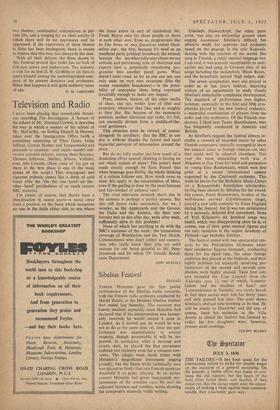Sibelius Festival
YEHUDI MENUHIN gave his first public performance of the Sibelius violin concerto, with the Finnish radio orchestra conducted by Martti Similil, at the Helsinki Sibelius festival that ended last Saturday. The occasion was keenly awaited, especially since Menuhin had declared that if his interpretation was favour- ably received, he would record it soon in London. As it turned out, he would be wise not to do so for some time yet, since the per- formance was unsatisfactory in several respects, though presumably it will be im- proved. In particular, after- a nervous and erratic start, he played the first movement .cadenza too violently even for a virtuoso con- certo. The adagio went much better. with Menuhin's magnificent instrument singing proudly, but the finale while technically sure was played so freely that one Finnish musician described it as gypsy playing. At an earlier concert Menuhin had given immaculate per- formances of the sonatine opus 80, and the adjacent berceuse and rondino, works showing the composer's masterly violin writing. Elisabeth Schwarzkopf, the other guest artist, was also on unfamiliar ground when singing Luonnotar, Sibelius's difficult but effective study for soprano and orchestra based on the passage in the epic Kalevala, dealing with the creation of the world. She sang in Finnish, a richly musical language but, I am told, it was scarcely recognisable as such; earlier she had sung in German nine of his songs including the melancholy 'Black Roses,' and the beautifully poised 'Sigh sedges, sigh.' The seven symphonies were not played in order as at last year's festival, depriving visitors of an opportunity to study closely Sibelius's remarkable symphonic development. The standard of performance was higher, however, especially in the first and fifth sym- phonies played by the new festival orchestra, a successful combination of players from the radio and city orchestras. Of the Finnish con- ductors, I liked best Tauno Hannikainen, who has frequently conducted in America and Britain. At Sibelius's request the festival always in- cludes a concert of recorded music by other Finnish composers, specially arranged to show the musical scene to foreign visitors—an idea that could well be adopted elsewhere. This year the most stimulating work was A Requiem in Our Time for wind and percussion by young Eino Rautawaara, which won first prize at a recent international contest organised by the Cincinnati orchestra. This week he leaves for the Berkshire Music Centre on a Koussevitsky foundation scholarship, having been chosen by Sibelius for the award. His cousin, Pentti Rautawaara, brother of the well-known pre-war Glyndebourne singer, played a new cello concerto by Einar Englund during the festival, but it was too unbalanced by a seriously deficient first movement. None of Yrjo Kilpinen's six hundred songs was heard, which was disappointing since he is, of course, one of their great musical figures and the only musician in the august Academy of Finland—age excludes Sibelius. The festival ended with two spectacular con- certs by the Philadelphia Orchestra under their conductor Eugene Ormandy, conducting there for the third time. No other foreign orchestra has played at the festivals, and their highly polished yet musically satisfying per- formances of the second and seventh sym- phonies were highly praised. Their first con- cert included the Four Legends from the Kalevala, opus 22, two of which. 'Lemmin- kiiinen and the maidens of Saari' and 'Lemminkainen in Tuoncla,' are rarely heard, in fact their scores were lost for thirty years and only printed last year. The suite shows Sibelius's abstract tone-painting at its best. He will be ninety in December and did not, of course, leave his seclusion in the Villa Ainola to attend the festival but listened by radio; his five daughters were, however, present most evenings.
GIAARI) BOURKE














































 Previous page
Previous page